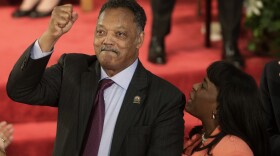Amendment two gives everyone making minimum wage in Florida the right to earn $15 an hour by 2026. The voter-approved constitutional amendment to raise the minimum wage in Florida is being crafted into law, in the form of a bill working through the state legislature. But some lawmakers are pushing efforts to exclude some from that pay raise.
Republican State Senator Jeff Brandes drafted a bill excluding felons, and those under 21, from the rise in minimum wage. He says he wants to limit wages for groups that are considered- quote- “hard to hire,” saying he believes employers will need a financial incentive to hire them.
“As minimum wage continues to rise, there are going to be winners and there are going to be some people who struggle to find jobs,” Brandes said. “Those tend to be teens with very low skills, the recently incarcerated, and then there’s other hard to hire groups.”
Brandes’ bill would allow the legislature to adjust the minimum wage to a “temporary training wage” which is a rate employers can pay new hires under 20 years old in the first ninety days. It’s lower than minimum wage.
Brandes said this would incentivize employers to look at applications from what he calls “hard to hire” groups.
W. Earl Sparrow Jr. is a community advocate in Lee County. He believes Republican lawmakers are targeting these so-called “hard to hire” groups because they don’t fit the demographic of their voting base.
“People--if they’re paid correctly, if they’re paid a living wage, they won't have to take a second job on, or they won't have to try to do something illegal or under the table to increase their quality of life,” Sparrow said.
He does not support Brandes’ proposal and questions who this bill helps, and who it may hurt in the long run.
“It all boils down to money,” Sparrow said. “The business owners that are scared that they’re going to have to see a dip in their profits margin by paying people more, are the ones that were against raising minimum wage. They’re not saying they can’t afford it, they’re saying that it’s going to be a hardship on them.”
Neil Volz, Deputy Director of Florida Rights Restoration Coalition, is familiar with the legislature’s cumbersome interpretation of voter-supported amendments. He’s been fighting since the passage of Amendment 4 in 2018 which restored voting rights for former felons; trying to ensure a true legislative interpretation of the amendment voters approved.
“We believe that returning citizens in Florida should be treated like anybody else,” Volz said. “Have the ability to make a full minimum wage, rather than a second-class status that would allow them to be paid less than a full minimum wage.”
Volz argued it would be wiser to focus efforts on helping people find employment and stay employed, while allowing employers and employees alike to prosper.
“We don’t think that we need to create another business administration within the government to manage this kind of project,” Volz said. “What we could really focus on, is tearing down barriers that currently exist to full employment opportunities for people.”
While some see the minimum wage increase as a good thing, others worry it will negatively impact industries like restaurant and hospitality.
Rafael Feliciano, President of Food Idea Group and Co-Founder of Sizzle SWFL, said increasing the minimum wage sounds good on the front end, but on the back end it’s going to significantly increase the cost-of-doing-business for restaurants.
Restaurants may eventually have to raise their prices to support the increased wages, but Feliciano said he isn’t sure if the average consumer will understand that.
“I think what we’re going to see is some businesses just go out, because they have not built the appropriate systems to forward that capacity of employee wage,” Feliciano said. “And then, you’re going to see the really good businesses adjust.”
The current minimum wage sits at $8.65 an hour. By September of this year, under the terms of Amendment Two, it will increase to $10 an hour. After that, it will go up one dollar every year until it reaches $15 in 2026.





